Fitzroy Minerals Exploration Update
VANCOUVER, BRITISH COLUMBIA, November 27, 2024 – FITZROY MINERALS INC. (TSXV: FTZ, OTCQB: FTZFF) (“Fitzroy Minerals” or the "Company") is pleased to provide an exploration update on its copper and gold-copper-silver projects portfolio in Chile.
Highlights:
- Rock chip samples from newly mapped veins at the Polimet Gold-Copper-Silver Project, Chile (“Polimet”), returned: 11.51 g/t Au and 0.93% Cu, 3.40 g/t Au and 2.65% Cu, and 3.38 g/t Au and 1.65% Cu.
- IP and ground magnetic geophysical surveys underway at Polimet to assist with final drill-targeting.
- Logistics preparation for drilling is underway at the Caballos Copper Project, Chile (“Caballos”) and at Polimet.
At Polimet, rock chip sampling returned grades up to 11.51 g/t Au and 6.10% Cu (Figure 1). Mapping continues to discover new vein outcrops and an ongoing soil geochemistry survey continues to expand existing, and find new, soil anomalies (Figures 2 to 5). Induced-polarisation (“IP”) geophysical and ground magnetic surveys are underway, ahead of the planned drilling program (Figure 5).
At Caballos, additional mapping and sampling have expanded the polymetallic vein zone in the western area of the concessions. Rock chip samples returned grades up to 14.68 g/t Au and 14.78% Pb (Figure 6). A mineralised felsic intrusion, emplaced along the Pocuro Fault Zone (“PFZ”), is the main target and is associated with a 1.1 km-long rock chip geochemistry anomaly in the southern part of the concessions. A scout drilling program will start imminently.
The Taquetren Gold Project, Argentina and related exploration programs are under review.
Merlin Marr-Johnson, President and CEO of Fitzroy Minerals, commented, "Fitzroy Minerals has a dynamic few months ahead in Chile, even before the Ptolemy Mining acquisition closes.
Regional work at Polimet has identified a variety of mineralising styles, indicating that there are multiple phases of mineralisation and that this is a metal-rich environment. The main focus is Au-Cu-Ag epithermal mineralisation that is largely hosted in veins and shoots, supported by high-grade rock chip samples and expanding soil anomalies. It is encouraging that mapping continues to identify new veins rich in both copper and gold in the main target area. Unlike El Bronce, the million-ounce deposit 13 km along strike to the northwest, Polimet has an important copper component content in addition to silver and gold. Geophysical surveys are in progress, and we are rapidly advancing to Phase 1 diamond drilling on the central epithermal gold-copper-silver targets.
A scout diamond drilling program at Caballos will test the mineralised intrusive that is present along the Pocuro Fault Zone. Using an existing track, we can get a drill rig to the centre of the main southern anomaly which grades 0.84% Cu at surface and put in some proof-of-concept drill holes to test the grade and dimensions of the intrusive at depth. We look forward to announcing the results of the geophysical surveys and the start of drilling soon.”
Polimet Gold-Copper-Silver Project, Chile
Background and New Concessions
At Polimet, mapping and site visits to surrounding properties have shown that a variety of mineralising styles are present, indicating that the region is metal-rich and that it has experienced multiple phases of mineralisation (Figures 1 to 5). Within three kilometres of the Polimet concession boundaries there are several small private mines extracting barite from veins, copper from mantos, and gold from veins. At one site to the southwest of Polimet, epithermal-gold mineralisation is overprinted by copper-manto replacement style mineralisation.
Fitzroy Minerals is focused on the main Au-Cu-Ag epithermal mineralisation that is largely hosted in veins and associated plunging shoots in the central and southern portions of the Project area. In general terms, geological mapping and sampling continues to corroborate soil geochemistry results, with mineralised veins and fractures returning good grades when outcrop is visible.
The trend of copper mineralisation has been mapped to the southeast, continuing up to and potentially beyond the Polimet concession boundary. In September, Fitzroy Minerals licenced two freely available concession areas adjacent to the southeast corner of the Polimet Property. The new licence areas are 187 ha in size, taking the total Project area to 2,290 hectares. The current Project boundaries are shown in Figure 1.
Geology, Mapping and Sampling
Rock chip samples returned gold grades as high as 11.51 g/t Au from a newly mapped vein in the southwest area at Polimet (Figure 2) with copper grades as high as 6.10% Cu from a vein in the southeast (Figure 1).
Mapping and sampling have identified a pair of parallel veins in the southwestern portion of the mineralised area (Figure 2). The veins were opened up by an artisanal miner. Rock chip sampling from these two veins returned samples with grades of 11.51 g/t Au and 0.93% Cu (sample ID: PN-06), 3.40 g/t Au and 2.65% Cu (sample ID: PN-04), and 3.38 g/t Au and 1.65% Cu (sample ID: PN-05).
The western vein is located within a 500 m long copper-in-soil anomaly and a coincident 300 m long gold-in-soil anomaly. The eastern vein is located within a discontinuous copper-in-soil anomaly (Figure 2), and the pulps from this section have not yet been analysed for gold.
To the west, northwest, east, and southeast of the central area, mapping has identified numerous veins and fractures stained with copper oxides that do not exhibit strong epithermal geological textures. Further work is required to determine if some of these copper zones are distal expressions of deeper epithermal systems or if they are later copper mineralisation that has used the same structural architecture for emplacement.
Figure 1. Geological map and rock chip sample results, Polimet Gold-Copper-Silver Project.
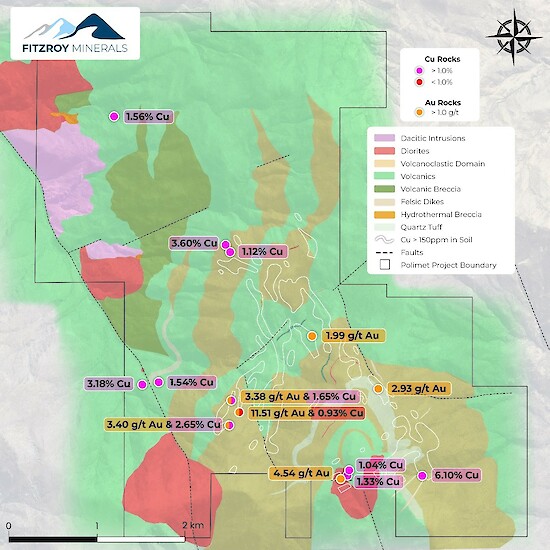
Geochemistry
Work at Polimet continues to advance the Project. Previously (Fitzroy Minerals news release dated September 12, 2024), Fitzroy Minerals announced soil geochemistry results, with a dataset of 800 sample points. Since then, a further 121 soil samples have been taken, expanding the dataset to 921 samples (Figure 3).
The aim of the sampling was to better define the limits to the soil anomalies. The new sample results have expanded the anomalies in the north and in the south. Although the copper-in-soil anomaly is now largely closed in the north there are trends in the central and southern areas that remain open (Figures 3 and 4). Mapping and sampling will continue along open trends.
Figure 2. Detail of newly mapped parallel veins, Polimet Gold-Copper-Silver Project.
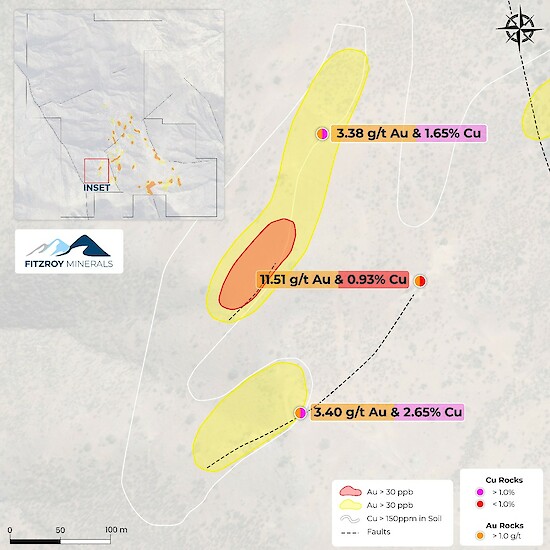
Fitzroy Minerals notes that the main target at Polimet is an epithermal Au-Cu-Ag system. As such, copper is a direct indicator for epithermal gold mineralisation at depth. The Company uses a bench-mounted XRF analyser to provide low-cost and quick copper-in-soil concentration results.
Fitzroy Minerals also reports gold-in-soil geochemistry results. From the pulps retained from the in-house copper-in-soil XRF analysis, Fitzroy Minerals selected 488 pulp samples to be analysed for gold. The selected pulps were sent to the AAA Laboratory, for analysis via ICP which has a lower detection limit of 1 ppb gold. The gold-in-soil geochemistry shows the gold and the copper soil anomalies largely occur together and are related to mapped veins.
Figure 3. Copper-in-soil anomalies and expansion of the soil grid survey area, Polimet Gold-Copper-Silver Project.
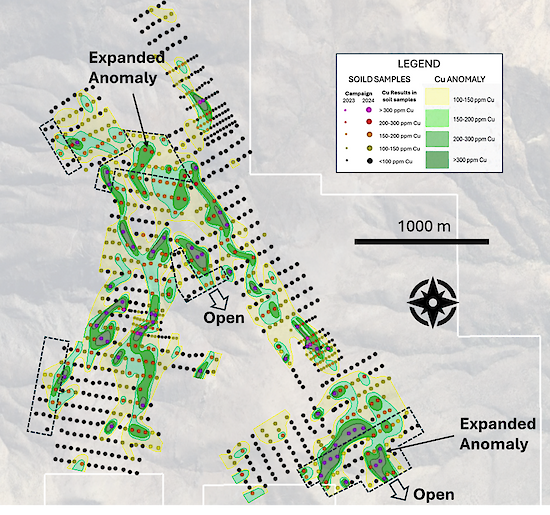
One area where gold is not linked to copper is a large open gold anomaly in the south (Figure 4, centre bottom) that may be controlled by lithology. Follow-up work including detailed mapping, rock chip sampling, and continued soil-geochemistry sampling is underway; assay results are pending.
First pass mapping noted that the area of the broad gold anomaly is largely characterized by unaltered porphyritic andesite. There are increased levels of silicification and epidotization to the southwest of this southern area. Current work aims to assess the relationship of the anomaly with gold disseminated in or associated with a preferential rock type or lithology.
Figure 4. Gold-in-soil geochemistry (also copper-in-soil 150 ppm contours), Polimet Gold-Copper-Silver Project.
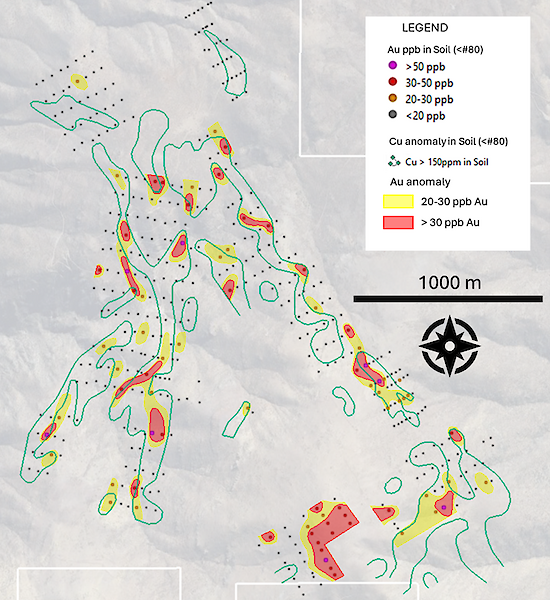
Geophysics
Geophysical surveys are currently underway at Polimet, ahead of the planned drilling. The objective of the surveys is to outline epithermal gold-copper-silver mineralisation hosted primarily in north-striking veins and structures.
Based on knowledge of the area, well marked conductivity anomalies are expected over the mineralisation. Strong magnetic features related to deeper intrusive rocks may be present. Both resistivity and magnetic data may outline structures and faults. A ground magnetic survey, consisting of approximately 315 km of east-west lines with 50 m line spacing will be completed. In parallel, an Induced Polarisation (“IP”) survey will be completed. The survey will use a pole-dipole array and a dipole spacing of 50 m expanded though 8 separations (n=1 to 8). The survey will provide a depth penetration of about 250 m and it will be conducted on 9 lines, totalling approximately 20 line-km of survey (Figure 5).
Figure 5. Soil geochemistry and IP grid location map, Polimet Gold-Copper-Silver Project (for soil assay results see Legend in Figure 4).

Drilling
At Polimet, a draft Phase 1 drilling plan of approximately 2,500 m is complete and logistics for drilling are being prepared. The drill hole locations will be finalised once the results and interpretation from the geophysical surveys are available.
Caballos Copper, Chile
At the Caballos Copper Project, mapping has identified that the main area of interest within a corridor parallel with the Pocuro Fault Zone (“PFZ”) (Figure 6).
As previously reported, there is a distinctive hydrothermal breccia and alteration zone running approximately 1.2 km north-south along the PFZ (see Figure 6), containing within it a 500 m-long felsic intrusion (Fitzroy Minerals news release dated July 29, 2024). The felsic intrusion has copper-oxide staining along most of its width, with occasional fresh disseminated chalcopyrite, and an average grade of 0.84% Cu. There is also an associated molybdenum anomaly of about 980 m x 50 m, with an average grade of 897 ppm Mo.
Figure 6. Southern Pocuro Fault Zone corridor and western vein samples, Caballos Copper Project.
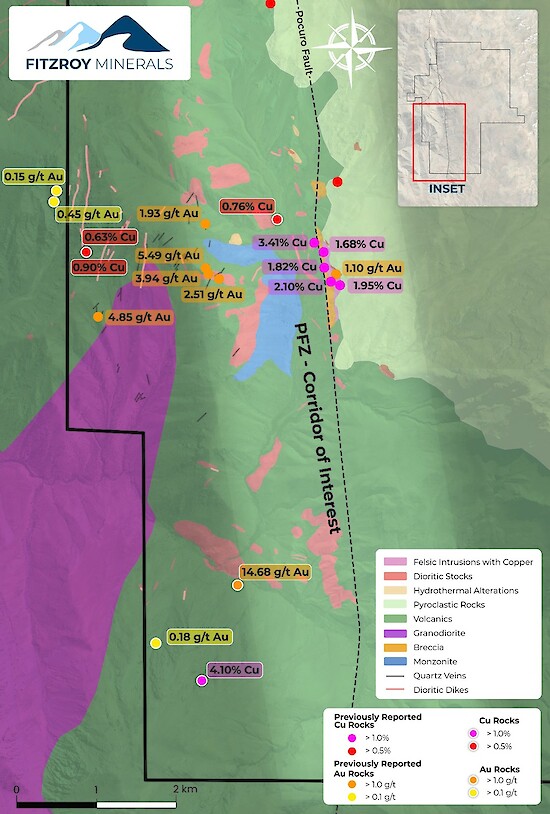
In the western portion of the Caballos area, further mapping and sampling took place during October once the snow cover at higher altitude melted. The mapping and sampling identified additional polymetallic veins in the west of the concession area, with thicknesses of up to 5 metres. Rock chip samples returned grades up to 14.68 g/t Au and 4.10% Cu in separate samples (see Figure 6). Fitzroy Minerals has now identified an area of approximately 6 km north-south and a width of approximately 2 km east-west with a preponderance of veins. Within this broad area, a smaller area of approximately 1 km x 1 km has a greater abundance of veins.
Fitzroy Minerals now considers that pre-drilling mapping and sampling of the initial areas of interest at the Caballos Copper Project, Chile is largely complete. The main target at Caballos is the mineralised felsic intrusion and the associated 1.1 km-long rock-chip geochemistry anomaly and breccia associated with the PFZ in the southern part of the concession area. The intrusion is mineralised, spatially associated with a breccia, and emplaced along the PFZ itself (see Figure 6). The intrusion is visible at surface for at least 500 m, and the breccia and alteration zone stretch for about 1,150 metres.
Following a data review, a scout diamond drilling program to test the mineralised intrusive has been designed. Using an existing track, Fitzroy Minerals has prepared a drill pad in the centre of the main southern anomaly. The aim is to test the grade and dimensions of the intrusive body at depth by drilling across the fault zone, the intrusion, and the breccia.
Taquetren Gold, Argentina
The Taquetren Gold Project is a low-sulfidation gold epithermal system, located 20 km northwest of the known Calcatreu low-sulfidation gold deposit. Work involving mapping, sampling, trenching and geophysics has identified a new gold province at Taquetren, including evidence of mineralisation at four separate sectors: Martha, Centro, Irma, and Irma West.
Irma and Irma West stretch an area of over 4 km and are characterised by sets of subparallel, semi-outcropping veins, hidden under a moderate layer of soil. The veins are often discontinuous along strike and mineralisation is variable in its distribution along strike and from vein to vein. Fitzroy Minerals recognises that Taquetren requires additional exploration work in the area to continue to test the continuity of the vein sets to the southwest of Irma West. Currently, however, Taquetren is undergoing a period of data review.
Polimet: Sample Preparation and XRF Process for Copper-in-Soil Geochemistry
Rigorous Quality Assurance (QA) / Quality Control (QC) procedures were followed during sample collection and preparation. The survey team used trowels and bags when sampling, cleaning the equipment between sample collection. For each sample, the location, date, time, depth, and other relevant information was recorded. For each sample a photograph was taken showing the GPS coordinates, the bagged sample, and the sample site.
In the sample preparation procedure, the following steps were taken:
- Log and record Sample ID.
- Assess to see if sample is wet or dry.
- Dry any wet samples by placing individually in a stainless-steel tray in an oven. Return dried sample to sample bag.
- Weigh dry sample.
- Gently roll and check bagged samples to ensure soil lumps are broken down.
- Transfer the sample to a stainless-steel tray.
- Pass the sample through a clean Riffle Splitter that feeds into two clean stainless-steel trays.
- Return the contents of one of the two trays to the sample bag. Pass the other tray through the Riffle Splitter again. Return the ¼ sample to the original sample bag and add the other ¼ sample to a new bag.
- Weigh the ¼ soil sample.
- Add the ¼ sample to the vibrating screens and separate the size fractions, recording the time required to separate.
- Take multiple readings of the fine-fraction (<80#) using the XRF analyser, recording the average.
- Carry out regular calibration checks of the XRF analyser using known reference materials.
Polimet: XRF Analyser versus Laboratory ICP Results
On May 14, 2024, Fitzroy Minerals reported that the XRF soil geochemistry results had an average variance of 8% from check ICP assays completed at the laboratory. Fitzroy Minerals continues to regularly calibrate the XRF analyser to further reduce variance in results. Fitzroy Minerals has carried out check assays on a selection of the 921 samples taken to date as part of its ongoing QA/QC.
Qualified Person
Dr. Scott Jobin-Bevans (Ph.D., P.Geo.), a Qualified Person as defined by National Instrument 43-101 and independent geological consultant to the Company, has reviewed and verified the technical information provided in this news release.
About Fitzroy Minerals
Fitzroy Minerals is focused on exploring and developing mineral assets with substantial upside potential in the Americas. The Company’s current property portfolio includes the Caballos Copper and Polimet Gold-Copper-Silver projects located in Valparaiso, Chile, and the Taquetren Gold project located in Rio Negro, Argentina, as well as the Cariboo project in British Columbia, Canada. Fitzroy Minerals’ shares are listed on the TSX Venture Exchange under the symbol FTZ and on the OTCQB under the symbol FTZFF.
On behalf of Fitzroy Minerals Inc.
Merlin Marr-Johnson
President and CEO
For further information, please contact:
Merlin Marr-Johnson
mmj@fitzroyminerals.com
+1 604-505-4554
For more information on Fitzroy Minerals, please visit the Company's website: www.fitzroyminerals.com
This press release does not constitute an offer to sell or a solicitation of an offer to buy any of the securities in the United States. The securities have not been and will not be registered under the United States Securities Act of 1933, as amended, or any state securities laws and may not be offered or sold within the United States or to or for the account or benefit of a U.S. person (as defined in Regulation S under the United States Securities Act) unless registered under the U.S. Securities Act and applicable state securities laws or an exemption from such registration is available.
Neither Exchange nor its Regulation Services Provider (as that term is defined in the policies of the Exchange) accepts responsibility for the adequacy or accuracy of this release.
CAUTIONARY STATEMENT REGARDING FORWARD-LOOKING INFORMATION
This news release includes certain statements and information that constitute forward-looking information within the meaning of applicable Canadian securities laws. All statements in this news release, other than statements of historical facts are forward-looking statements. Such forward-looking statements and forward-looking information specifically include, but are not limited to, statements that relate tofurther exploration work or exploration results on any of the Company’s Polimet, Caballos or Taquetren properties.
Statements contained in this release that are not historical facts are forward-looking statements that involve various risks and uncertainty affecting the business of the Company. Such statements can generally, but not always, be identified by words such as "expects", "plans", "anticipates", "intends", "estimates", "forecasts", "schedules", "prepares", "potential" and similar expressions, or that events or conditions "will", "would", "may", "could" or "should" occur. All statements that describe the Company's plans relating to operations and potential strategic opportunities are forward-looking statements under applicable securities laws. These statements address future events and conditions and are reliant on assumptions made by the Company's management, and so involve inherent risks and uncertainties, as disclosed in the Company's periodic filings with Canadian securities regulators. As a result of these risks and uncertainties, and the assumptions underlying the forward-looking information, actual results could materially differ from those currently projected, and there is no representation by the Company that the actual results realized in the future will be the same in whole or in part as those presented herein. the Company disclaims any intent or obligation to update forward-looking statements or information except as required by law. Readers are referred to the additional information regarding the Company's business contained in the Company's reports filed with the securities regulatory authorities in Canada. Although the Company has attempted to identify important factors that could cause actual actions, events, or results to differ materially from those described in forward-looking statements, there may be other factors that could cause actions, events or results not to be as anticipated, estimated or intended. For more information on the Company and the risks and challenges of its business, investors should review the Company's filings that are available at www.sedar.com.
The Company provides no assurance that forward-looking statements and information will prove to be accurate, as actual results and future events could differ materially from those anticipated in such statements or information. Accordingly, readers should not place undue reliance on forward-looking statements or information. The Company does not undertake to update any for-ward looking statements, other than as required by law.
